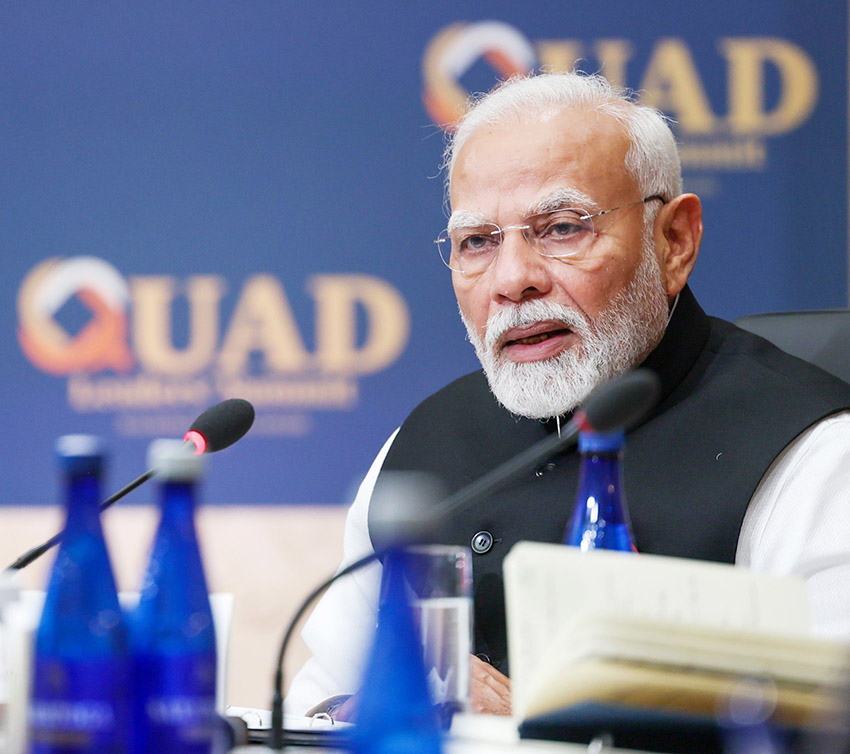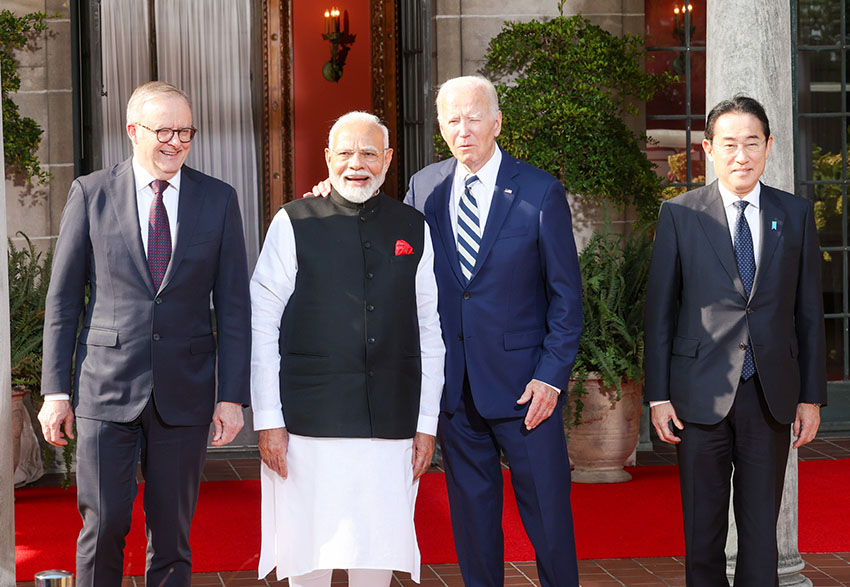QUAD – Partnering for Stability in Indo-Pacific
By Mahendra Ved

New Delhi. Quad, the quadrilateral alliance of four – India, Japan, the United States and Australia is “not against anyone” but an alliance which supports “rules-based international order, respect for sovereignty and territorial integrity, and peaceful resolution of all issues.”
With these words in his opening address at the Quad Leaders’ Summit on September 21 this year, Prime Minister Narendra Modi made it clear that the alliance, “not against anyone” and for the greater good of the world, had “come to stay.”
This was the most important engagement Modi had during his four-day visit to the United States. Quad was meeting for the sixth time, twice virtually, in response to the initiative taken by the outgoing US President Joe Biden. Indeed, Biden was playing the host in Wilmington, his home town in Delaware. This was a farewell summit for Biden as he nears the end of his term in office.
The summit was also important, Modi pointed out, because the world was surrounded by conflicts all around and needed peaceful resolutions. In contrast, the Quad is important for humanity.
It was a small and compact gathering of four world leaders with as many aides in a single room. Besides Biden and Modi were Australia’s PM Anthony Albanese and Japan’s PM Fumio Kishida.
“Our meeting is taking place at a time when the world is surrounded by tensions and conflicts. In such a situation, the Quad’s working together based on shared democratic values is very important for the entire humanity,” he said.
Modi stressed that Quad was an alliance which supports “rules-based international order, respect for sovereignty and territorial integrity, and peaceful resolution of all issues.”
“Free, open, inclusive and prosperous Indo-Pacific is our shared priority and shared commitment,” said PM Modi, adding that the alliance had already taken initiatives in areas like health, climate change, security, emerging technology and capacity building.

PM Modi addressed President Biden, acknowledging his contribution to the alliance saying: It gives me immense pleasure to participate at this Quad Summit during my third term. Under your leadership, the first summit of 2021 was organised,” he said. “In such a short time, we have expanded our cooperation in an unprecedented way in every direction. You have played a very important role in this. I thank you from the bottom of my heart for your commitment and contribution to Quad.”
He added that India would be happy to host the summit in 2025.
A free, open, inclusive and prosperous Indo-Pacific is the grouping’s priority, Modi said, without naming any country, China in particular, which is engaged in hotly contested territorial disputes in both the South China Sea and the East China Sea. China claims sovereignty over all of the South China Sea. Vietnam, Malaysia, the Philippines, Brunei and Taiwan have counter-claims.
The Quad Leaders’ Summit this year was earlier supposed to be held in India, but Biden was keen to hold the event in his hometown.
The U.S., Japan, India and Australia had in 2017 given shape to the long-pending proposal of setting up the “Quad” or the Quadrilateral coalition to counter China’s aggressive behaviour in the Indo-Pacific region.
However, India has been careful not to be part of any military alliance and maintains its adherence to ‘pluralism’. It will likely continue to walk the tactical tightrope on the Quad. India’s unwillingness to commit to a military alliance was recently highlighted by its Minister of External Affairs Subrahmanyam Jaishankar’s public rejection of an Asian NATO. Given this stance, it appears that the Quad is most likely to maintain its current trajectory. It will focus on cooperation in humanitarian assistance and disaster relief, climate change management, health security, and limited maritime security cooperation.
A less likely scenario is that India allows the Quad to signal and demonstrate its effectiveness to China and the region by fully embracing its security dimension. This would result in increased military exercises under the name of the Quad – not Malabar – and naval, not simply maritime, cooperation.
India has to face the complexities as a major Asian nation. Come January 2025, the much-anticipated – and apprehended, since that is also part of the worldview – Mr Donald Trump’s second tenure as the United States President will begin, impacting the world for the next four years. He has made known his determination to confront and ‘contain’ China. On that score, he will continue on the path trodden by Biden.
But January is also the time Russian President Vladimir Putin is expected to visit India as part of the annual Indo-Russian dialogue that began way back in 2001. The dates are being worked out. Diplomatic observers say that Trump’s India visit could also take place early enough, or in time for, the India-hosted Quad summit.
Willy-nilly, whichever way one views Quad, the focus could be on India, the host and its approach to the group.
India’s unwilling to join any military alliance or grouping is well known. It also plays an important role in two other groups, the Shanghai Cooperation Organisation (SCO) and the BRICS — Brazil, Russia, India, China and South Africa. In diplomatic terms, at least, the Quad should be in confrontation with them. Both these groups had their summits during 2024 and at the BRICS, to which more and more countries want to join, the idea of a currency to trade in that would be outside the domain of the US dollar, has been mooted.
President-elect Donald Trump though has already warned against global or regional groups that do not accept the American worldview and the dollar dominance in world trade and has singled out among others the BRICS. Indeed, he has threatened serious sanctions.

Read India’s continuing dialogue with Putin, the ‘aggressor’ in Ukraine, and its principal ally, China with which India has recently ushered in a thaw and this adds to the complexity of its role in Quad and the ability/readiness to conform to Trump’s approach to the Indo-Pacific at least, on its military aspects.
As for India, its role in Quad will be contingent upon the degree to which it is willing to deviate from its historical tradition of strategic autonomy and aversion to military alliances and the degree to which geographical separation would facilitate or hinder mutual support in peace and conflict.
This is not to say that India will reject Quad outright or be ready to become a pariah in the group. As Arun K. Singh, a former Indian envoy to the US writes: “Biden hosting four summits is an attestation of the importance attached by the US to this framework for cooperation and coordination. It has also worked to India’s advantage. The US is now more willing to partner with India in terms of technology. The two countries launched the pathbreaking Initiative on Critical and Emerging Technologies (iCET) in January 2023, which provides for cooperation in Artificial Intelligence (AI), quantum, biotechnology, semiconductors, space, and defence, among others.
It has provided a cushion to handle disagreements on issues such as the Russia-Ukraine conflict. There was a proposal in the US Senate that India should be exempt from sanctions under the Countering American Adversaries through Sanctions Act (CAATSA) for major defence and other purchases from Russia because it is a member of Quad.”
Singh notes that Quad has enabled the US to explore plurilateral convergences with India beyond the strengths of the bilateral relationship. From the Indian perspective, it has catalysed greater willingness in the US to do more with India bilaterally. Beyond the iCET, the US has now authorised technology transfer to India of GE F 414 jet engines, which had been difficult earlier. Japan and Australia are also willing to do more with India bilaterally, because of Quad and the enhanced US willingness.
In the coming months, with summit-level visits to and from India lined up, it would be interesting to watch how India performs its complex role.






